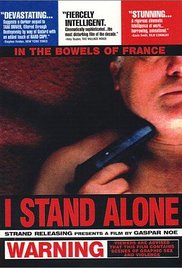
I STAND ALONE/ SEUL CONTRE TOUS
France, 1998, 93 minutes, Colour.
Philippe Nahon, Blandine Lenoir, Frankie Pain, Martine Audrain.
Directed by Gaspar Noe.
I Stand Alone was the first feature film from Argentinian-born director, Gaspar Noe; his films were made in France. After several short films, including Carne, which featured the character of the butcher from this film and the same actor, this was his first full-length film. He was to go on to make a number of short films, segments of feature films and controversial films, Irreversible about rape, Enter The Void, set in Japan and nihilistic in its perspective and the very explicit, filmed in 3D, Love.
This film is about a brutal man. The style of filmmaking is frequently brutal – and it is a brutal assault on the sensibilities of the audience. The film received great acclaim because of its style, its sombre subject and its consistency in presenting the portrait of an angry man, reaching middle age, frustrated, poor in relationships, sexually active but harsh towards women, violent and experiencing prison (and a sexual experience with a cell mate, though he is homophobic), finding that he cannot be employed, that he cannot take up his profession as a butcher of horse meat, finally angry with the owner of an abattoir and others who have humiliated him, plans to kill them – and, in his descent into madness, allowing previous incestuous feelings towards his daughter to surface.
Philippe Nahon gives a powerful performance as the butcher, with a great deal of monologue intensity.
Noe is a distinctive director – but a hard filmmaker for most audiences.
1. The impact of the film? Hard and harsh? Audience sensibility and sensitivity?
2. The work of the director, Argentinian-born, working in France, his short films, the predecessor to this feature, Carne, his directness, in matters of violence and sexuality, impact on the emotions?
3. French film at the end of the 20th century, the perspective on 1980, French society, French characters, universal application?
4. An ugly film, the locations, homes, the butcher’s shop, the nursing home, prison, the warehouse, the abattoir, the bar, the asylum? Musical score?
5. The detail of the portrait of the butcher, aged 50, his appearance, his narrative voice over, the intensity of his continued monologues?
6. The butcher, an Everyman character, his angers, an initial victim, his madness, as an orphan, clerical abuse, lack of opportunities, no education, his becoming a butcher – and the popularity and reputation of horse meat? His shop, the pregnant girlfriend, the birth of his daughter, the woman abandoning them because she wanted a son? Caring for his daughter over the years, the blood, assuming that the man had raped his daughter, not recognising menstruation, stabbing the man? Arrested, court, going to prison, life in prison, the cellmate, the sexual encounter? Selling his shop to a Muslim? His daughter, mental retardation, going into the institution? Getting out, the bar, his work, the owner, her promise of a shop, moving north, her not fulfilling the promise? Getting a job as a watchman? The nursing home, the nurse, witnessing the death? His anger at his mistress, punching her, a miscarriage? Returning to Paris, rejected from jobs, seeking advice from acquaintances, not getting a job in the abattoir, the decision to murder the owner, in the bar, the gun, the bullets, his intended targets of those who had humiliated him? With his daughter, the incestuous feelings, his justification?
7. The women in the film, the perspective on women, the initial girlfriend, pregnant, walking away from the butcher and the daughter? The mistress, older, owning the bar, the promise of the shop, moving, her pregnancy, the butcher’s anger, punching her, miscarriage? The relationship with the nurse at the nursing home?
8. The daughter, her upbringing, her mental condition, in the institution, returning home, the object of her father’s feelings?
9. The butcher’s lack of relationships, consulting friends who shun him, the shop and the customers, the prison, his victims?
10. A critique of French society, poverty, lack of education? A film of angers, prejudices, homophobia – and destruction?